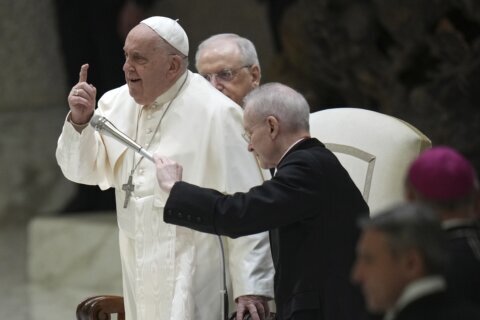CHARLESTON, W.Va. (AP) — West Virginia students struggling to figure out how to pay for college in one of the nation’s poorest states after the botched rollout of a new federal student aid application could get help under a bill headed to Gov. Jim Justice.
State lawmakers approved $83 million for higher education — including $51 million for grants to help students pay tuition — during a special session that ended Tuesday.
The state’s colleges and universities have seen a 26% reduction in applications, which Republican Senate Majority Leader Tom Takubo called “dramatic and devastating.”
West Virginia lawmakers also voted to provide $183 million to the state agency tasked with caring for people with intellectual and developmental disabilities, but not until after considerable debate about how it should be accessed and used.
The special session dealing with funds supporting some of the most vulnerable groups in West Virginia, where 1 in 4 children live in poverty. Justice last month declared a state of emergency that allows students to receive state scholarships without having their Free Application for Federal Student Aid, commonly known as FAFSA, processed by the federal government.
Students applying for college have been left in limbo as they await changes to FAFSA, which is used to determine eligibility for federal Pell Grants. The update was meant to simplify the form but took months longer than expected. That has left colleges with less time to make financial aid offers and students with less time to decide where to enroll.
The Legislature this week approved a resolution urging the federal government to accelerate FAFSA processing. Lawmakers also extended Justice’s state of emergency through at least Oct. 15.
“We’re talking about kids in our community that are looking at us right now and hoping and praying and families that are hoping and praying that we will come together and solve this problem that we didn’t create,” Republican Del. Brandon Steele said on the House floor Tuesday.
Although the FAFSA delays weren’t created by state lawmakers, Steele said it’s their responsibility to do what they can to help ease the burden on families.
Lawmakers were already scheduled to hold regular interim meetings at the state Capitol on Monday and Tuesday when Justice made the special session call last Friday. Most items were part of the governor’s proposed budget introduced in January for the new fiscal year starting in July that did not get a final vote before lawmakers wrapped up their 60-day regular session in March.
Among proposals lawmakers approved were $150 million for road paving and other maintenance; $50 million for a new state agriculture lab at West Virginia State University; $10 million for food banks; and $2 million to help pay for contract nursing costs at the state veterans’ home.
The $5 million for the Department of Health and around $183 million for the Department of Human Services comes as lawmakers have questioned how state officials in the formerly combined Department of Health and Human Resources use taxpayer money.
A Department of Human Services report showed that in fiscal year 2023, around $29 million dollars meant to be spent on services for people with disabilities went unused, according to reporting from West Virginia Watch. A department spokesperson didn’t return an email request for comment on Tuesday.
House lawmakers could not get senators to agree on a provision specifying that money would go to increasing provider reimbursement rates for those who care for people with disabilities, along with other items.
The bill approved by lawmakers creates a new fund where agency secretaries could transfer money to increase provider reimbursements, but it doesn’t require the money be spent in that way. The secretaries would also be required to file monthly reports to a legislative oversight committee explaining any transfers.
Copyright © 2025 The Associated Press. All rights reserved. This material may not be published, broadcast, written or redistributed.








